august reading recap 📚
as seen on my shelf #2
Second only to reading an actual book is the process of deciding what book to read. I am not a mood reader; I am a girl with lists. On my notes app, there's a list of all the books I own. When I buy a book, it goes to the top of that list, and when I get to read it—anytime from a few months to two years later—I tap that little circle, it turns yellow, and then flies away to the bottom. Endorphins are released.
At the very bottom of my “Books I Own” note, you’ll find two very important lines that represent the state of my book-buying conscience:
Unread: #
Owned: #
Right now, I own 457 books, and the number of those that are unread is between me and my iPhone.
I love the ritual of it all. Buy a book: add it to the list, unread books up by one, owned books up by one. Read a book: click the circle, unread books down by one.
This list is also a timestamp of my reading preferences. When I picked up reading again two years ago, The Seven Husbands of Evelyn Hugo was the first thing I read, on a trip to Athens. Back then, I read a lot more African literature, YA mysteries, and a whole lot of Colleen Hoover—something I’d never do now. The higher up the list you go, you’ll find more translated fiction, literary fiction, and most recently, a whole lot of family sagas.
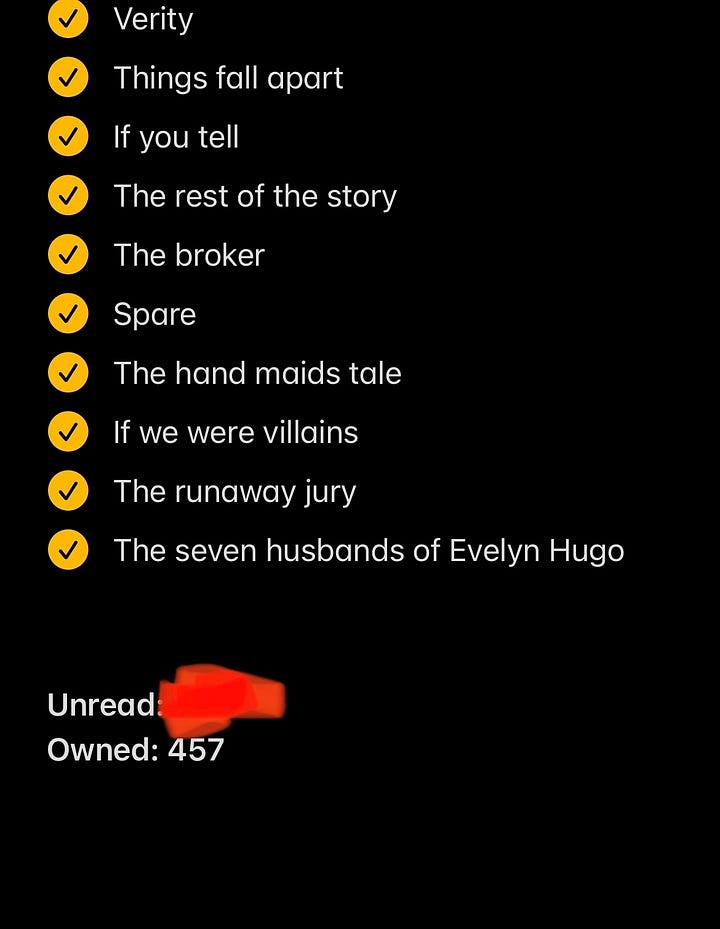
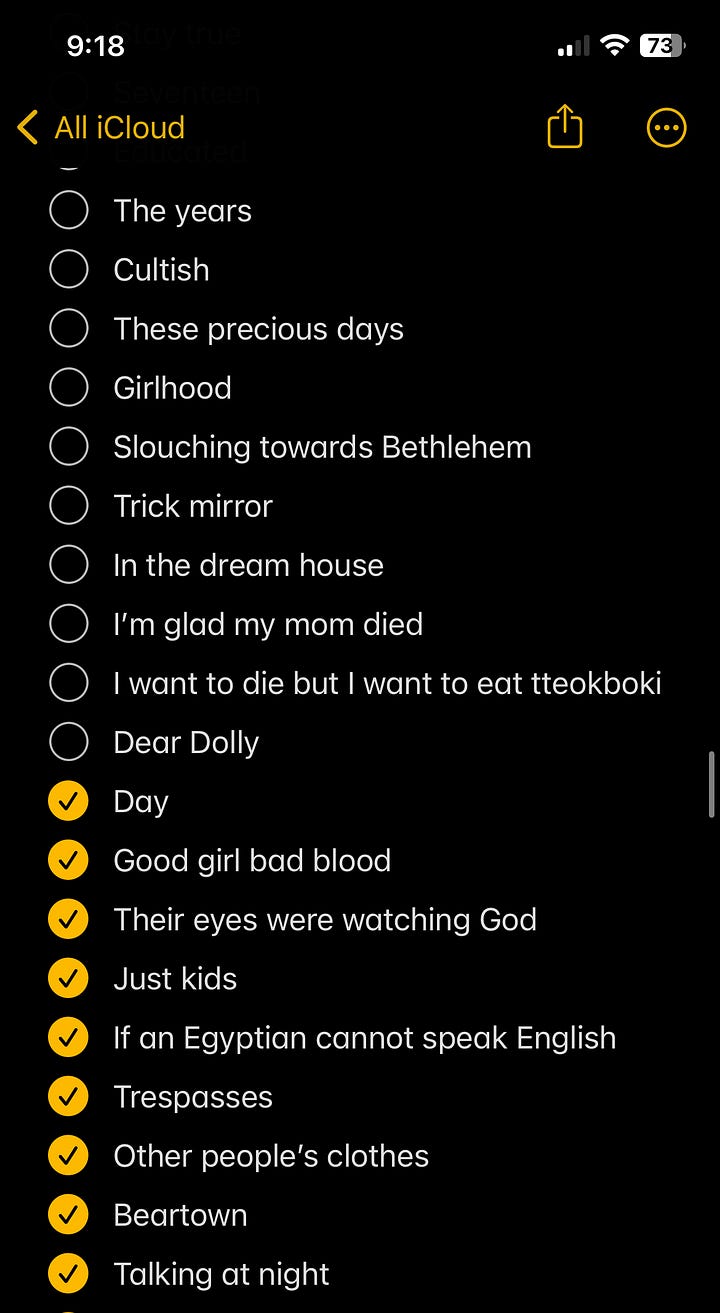
One of my goals for this year was to read less. There were things I wanted to do—starting this newsletter, for example—and for that, I’d need to reclaim more than a few hours of my day. There was a time when I’d clear anything between 16 to 22 books a month (WILD!), but these days I shoot for 10. Which brings me to yet another Note…
For each month, I have a list of 10 books I want to read. (And because I’m whatever the opposite of a mood reader is, once a book gets on the list, it stays on the list. No switchies, sorry). Now, I don’t follow exact rules when making these lists, but there are GUIDELINES:
at least one big book a month (600<)
most months I throw in one short story collection
a thriller or two
one nonfiction (usually memoirs)
at least one translated (or non-Western) fiction
a book for my newsletter book club
one book I really want to read
and one book I’ve been putting off
I try to get a good balance of genres, book length, and vibes. For example, I avoid reading more than two sad books at a stretch. I also try not to put pressure on myself to get through all ten books each month, but I do hate to see a list run over. At the end of each month, I already have the 10 books for the next month picked out, but before starting on that list, I indulge the little bit of spontaneity in me by picking one random, unplanned book to read. Whatever suits me that day.
So my reading pattern goes: 10 planned books, one spontaneous pick, 10 planned books, and on and on.
It might not sound like it, but I promise you, this makes my brain !SO HAPPY! and extends the experience of reading beyond what’s on a page. I have little rituals for while I’m reading a book (Storygraph > Goodreads), and for after I’ve read a book. There’s a book purging process, there’s rules for buying hardback vs. paperback and rules for getting used vs. new books. I promise to get into these in later editions.
If I had to pick a book title that described my personality, it’d have to be Games and Rituals. What’s yours? Let me know in the comments.
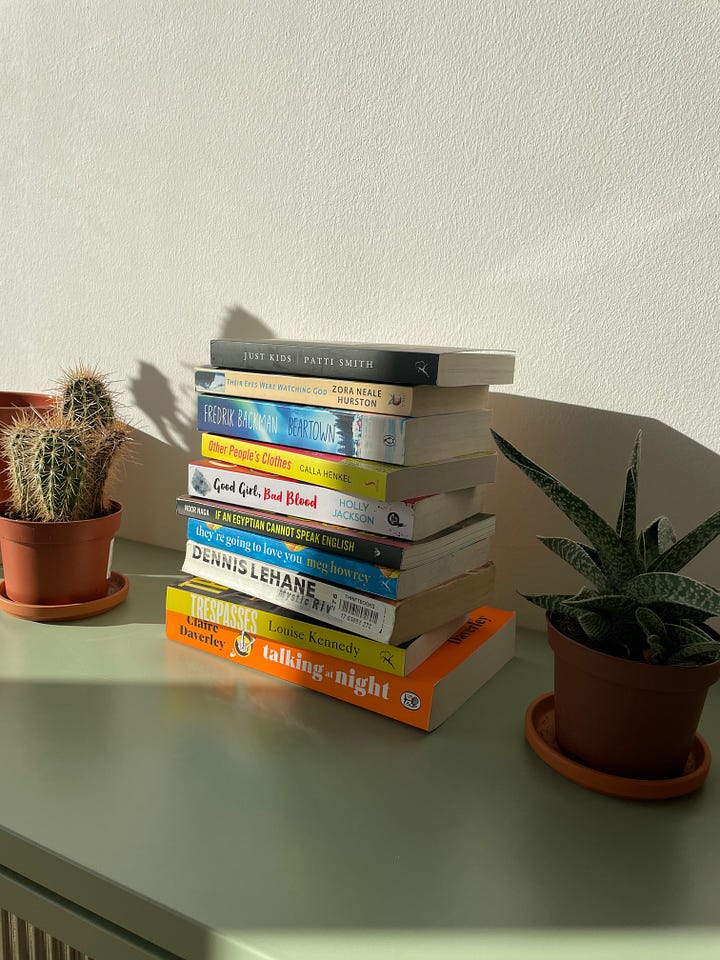
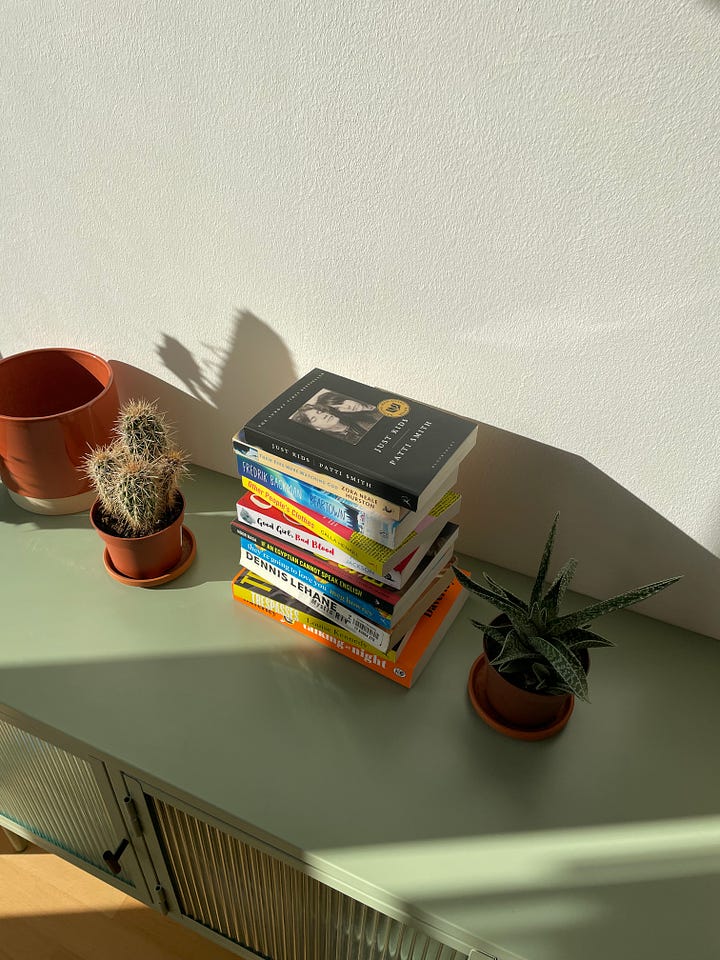
BOOKS I READ IN AUGUST
Mystic River by Dennis Lehane
I started this month like I start most months—reading a great thriller. I was flying back home to Germany from Portland, and there's something about train rides and plane rides that demands a delicious mystery. I do this thing where, if I'm undecided about watching a thriller, I'll go to Wikipedia and read the plot. Of course, this ruins the whole thing almost every time (the point is the twist, after all), but yet I persist. I'd done this for Mystic River long enough ago to forget the details but remember that it was good—really good—and the book didn't disappoint. I truly believe that they don’t write thrillers like these anymore—intelligent and terrifying. Sometimes sad. Not cheap or tropey. If you want a really good thriller that explores themes of class, generational trauma, small towns, toxic masculinity, love... this one's for you.
They're Going To Love You by Meg Howrey
Goodreads describes this book as a magnetic tale of betrayal, art, and ambition, set in the world of professional ballet, New York City during the AIDS crisis, and present-day Los Angeles. I describe it as unresolved daddy issues that went on 20 years too long. I read this in Amsterdam, and it felt right. It's not a book that's stuck with me at all, but it was a nice enough read, with a very nicely resolved ending. Miscommunication is my least favorite literary tool because I’d be reading a book and thinking, wow, a simple email would have done the job.
Talking at Night by Claire Daverley
This is another story built on years and years of miscommunication and missed chances, made manageable because the author writes a lot like Sally Rooney, and then less manageable as the characters grow older, and my patience grows shorter, because surely we've been here before. Will and Rosie meet as teenagers. They’re opposites in every way. She overthinks everything; he is her twin brother’s wild and unpredictable friend. But over secret walks home and late night phone calls, they become closer—destined to be one another’s great love story. Until something very tragic gets in the way, and they spend years circling each other, ever tormented, ever in denial. I know so many people loved this one, and so did I—until about halfway through. I like books where people DECIDE, and cannot abide a plot built on people being decidedly undecided!
Beartown by Fredrik Backman
Beartown centers on a small Swedish hockey town torn apart when the star player SAs a classmate. We follow a large cast of characters as they grapple with how their lives and the town changes, and who they want to be in the midst of that change. This book has a bit of a cult following, but I'm going to tell you something and I need us all to be calm about it: I do not enjoy Frederick Backman's writing. This is something I could never say on bookstagram, so I am saying it here. I've read two Backman books, and both felt like he was narrating a story, not like I was reading a story. Does this make sense? This one was particularly difficult to get through, because each chapter starts or ends with some cheesy truism like "Because that's what friendship is" or "Every day can mark a minute or a lifetime depending on who you spend it with". Huh? I think part of the appeal of this book is how it deals with very difficult subjects in an approachable way, but there was something a bit too whimsical about this narrative style for me. Half the time I was rolling my eyes and thinking, okay Fredrik.
Other People's Clothes by Calla Henkel
Hoping to escape the pain of the recent murder of her best friend, art student Zoe Beech moves to Berlin for a semester abroad, where she sublets an apartment with fellow American student Hailey Mader, who idolizes Warhol and Britney Spears and wants nothing more than to be an art star. Soon, they realize that their landlady, Beatrice, who is supposed to be on a residency in Vienna, is watching them—and her next book appears to be based on their lives. Taking stock of their mundane routines, Hailey insists they become people worthy of a novel, and things get crazy. I feel like every book I've read that's set in Berlin features young women slowly coming undone as they give in to the vices that define the city. Just me? It pains me to see young women make such bad decisions, like a trainwreck you can't look away from. There were some plotlines here that were too fantastical and a few things that just didn't add up. But sometimes you have to take a book for what it is and allow yourself to be deceived. If you can do that, this is a pretty good read.
Trespasses by Louise Kennedy
Set in Northern Ireland during the Troubles, Cushla lives a quiet life with her mother in a small town near Belfast. By day she teaches at a parochial school; at night she fills in at her family's pub. There she meets Michael Agnew, a barrister who's made a name for himself defending IRA members. Against her better judgment—Michael is not only Protestant but older and married—Cushla lets herself get drawn in by him and his sophisticated world, and an affair ignites. I'm very biased towards Irish fiction and anything set in the Troubles, so I loved this one. There's a part of my brain that recognizes that this probably wasn’t that great of a book, though. I wanted more affair, more fallout, more scandal. Still, it was a nice read.
Just Kids by Patti Smith
I'm going to assume you know this one. I've decided to read one nonfiction book a month, and I thought Patti Smith's award winning memoir would be a great place to start. I didn't enjoy every moment of reading this book, but the parts I loved made the reading experience more than worthwhile. More than anything, this book made me think. Really think. What is love and art and companionship? What is community? What has been lost in a world that continues to pervert these things? Is the real value found in the journey? I'm still thinking.
Their Eyes Were Watching God by Zora Neale Hurston
I read my first Toni Morrison a few months ago and stocked up on a few of her books. Someone said to me, "If you enjoy Toni Morrison, check out Zora Neale Hurston," and so I did. Fair and long-legged, independent and articulate, Janie Crawford sets out to be her own person—no mean feat for a Black woman in the '30s. Janie's quest for identity takes her through three marriages and into a journey back to her roots. Writing book reviews doesn't come easily to me, partly because I often don't have the words to describe how good some books are. So I'll just say this: it's a classic for a reason. It's a sad book that's somehow still brimming with joy and hope. The dialect took some time to get used to and slowed down my reading a bit, but that meant I was able to take in all the book was trying to give me. Can't wait to re-read.
Good Girl, Bad Blood by Holly Jackson
Start with a thriller, end with a thriller. I don't know if I'd categorize this series as a cozy mystery, but since it's YA and pretty tame compared to most of the thrillers I read. I read A Good Girl’s Guide to Murder two years ago, bought this sequel right after, and it’s been sitting on my shelf ever since. It’s not as good as the first one, but still a page-turner. I’ve heard the third book gets really dark, so I’ll be skipping that.
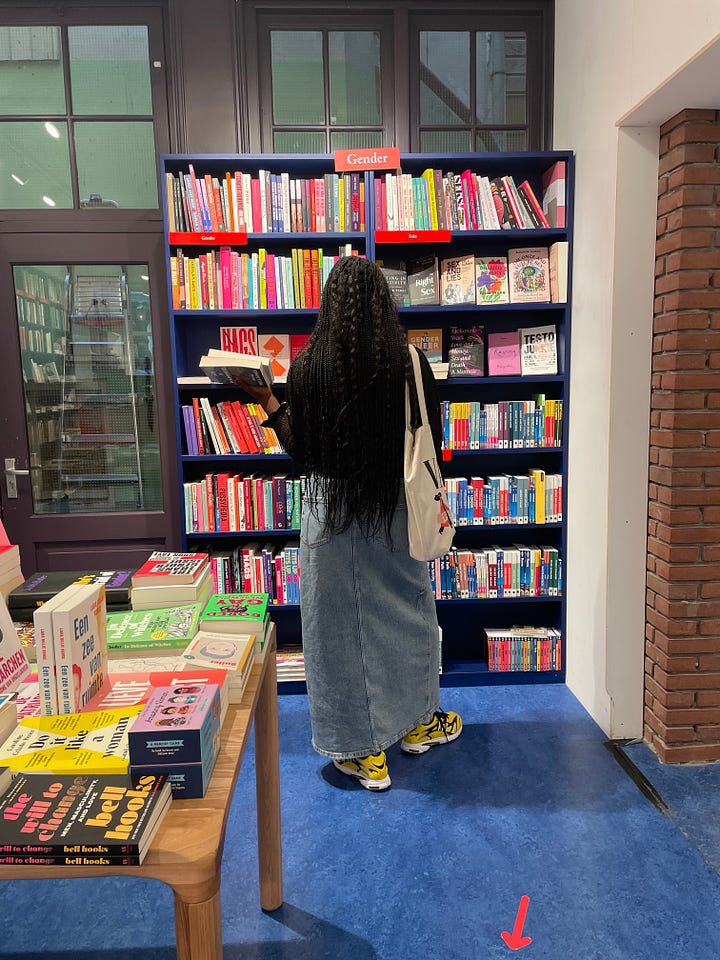
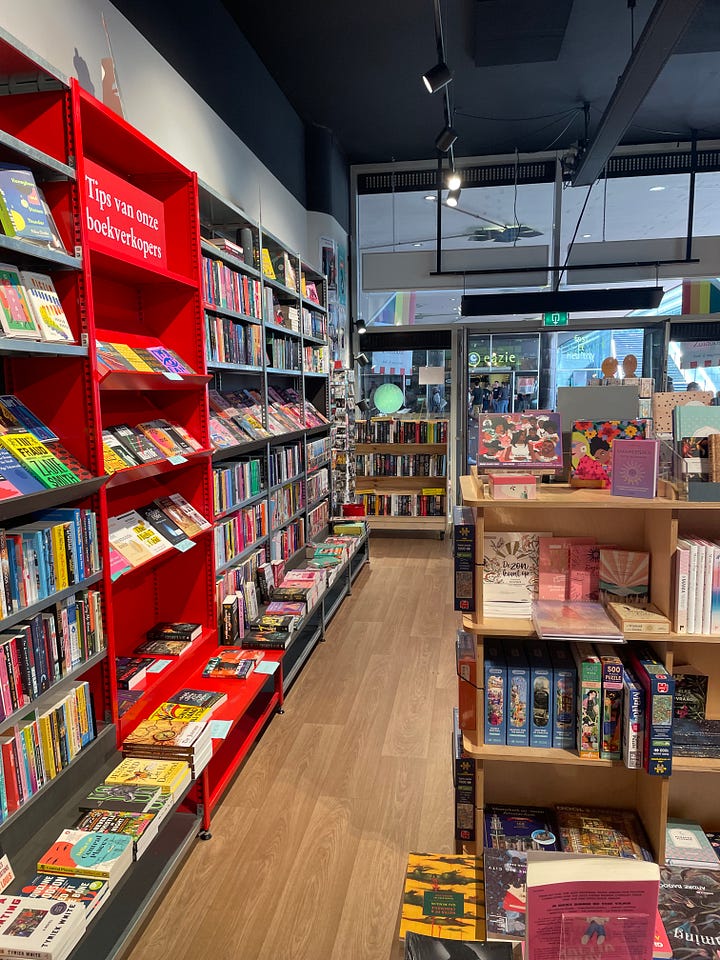
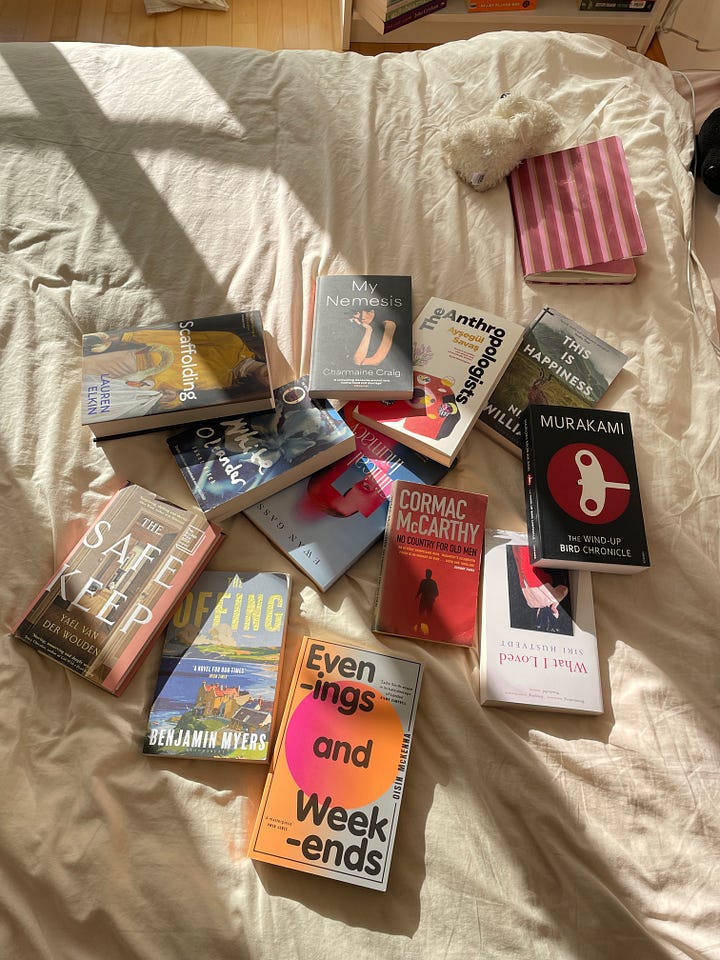
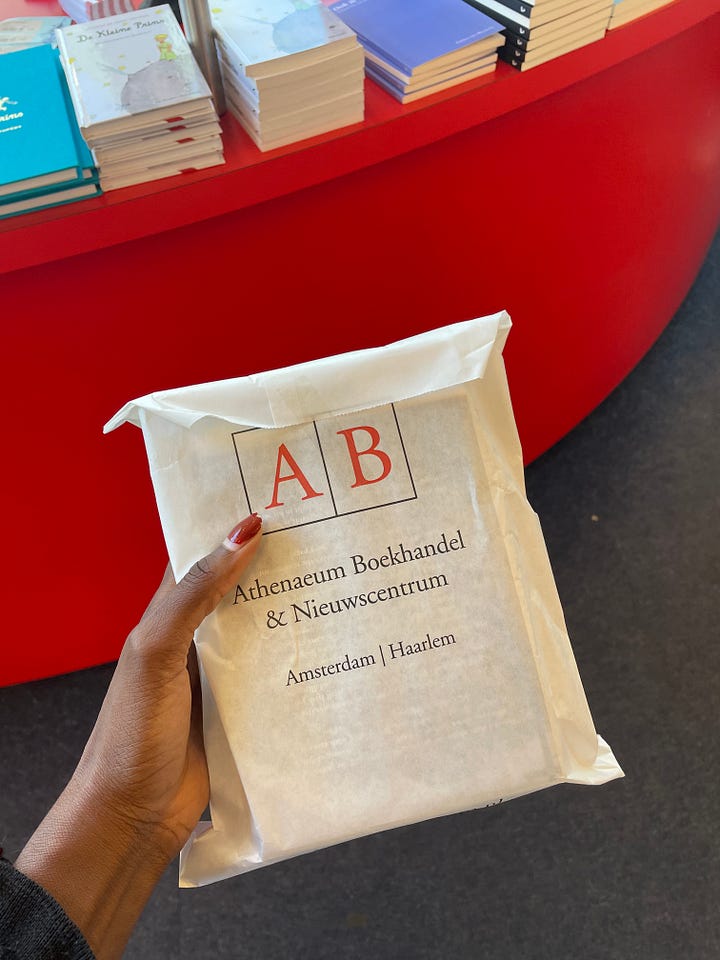
BOOKS I BOUGHT IN AUGUST
The God of the Woods by Liz Moore
The Wind-Up Bird Chronicle by Haruki Murakami
Scaffolding by Lauren Elkin
My Nemesis by Charmaine Craig
Clinical Intimacy by Ewan Gass
Evenings and Weekends by Oisín McKenna
What I Loved by Siri Hustvedt
This Is Happiness by Niall Williams
White Oleander by Janet Fitch
No Country for Old Men by Cormac McCarthy
The Offing by Benjamin Myers
The Anthropologists by Aysegül Savas
The Safekeep by Yael van der Wouden
ICYMI, last month I decided to start a bookclub for as seen on where each month I’ll invite one Substack creator to read a book with me and discuss it for the newsletter. For my first edition, I asked of Extracurricular, and we read If An Egyptian Cannot Speak English by Noor Naga
A dark romance following an Egyptian American woman and a man from the village of Shobrakheit who meet at a café in Cairo. He was a photographer of the revolution, but now finds himself unemployed and addicted to cocaine, living in a rooftop shack. She is a nostalgic daughter of immigrants “returning” to a country she’s never been to before, teaching English and living in a light-filled flat with balconies on all sides. They fall in love and he moves in. But soon their desire—for one another, for the selves they want to become through the other—takes a violent turn that neither of them expected.
Let’s start with the structure, because for me that played such a big part in my experience of reading this book. I felt like each of the three parts told the story in a different way. What did you think?
I thought the structure was really fascinating. We’re dropped kind of in the middle of the book, with little explanation of the setting, and we get continuous layers of explanation about the world undergirding the narrative as the plot progresses. The footnotes in the second section were an interesting choice. I didn’t necessarily need them to understand the novel—not because I’m an expert in Egyptian society or anything like that, but because I’m comfortable allowing the text to exist, knowing that there are things I won’t be familiar with. But what was most fascinating to me was the last section. I really liked that piece because it felt like there was this self-awareness and understanding of the kind of criticism the novel would receive in an American setting. I interpreted the structure as this continued mediation of the narrative for the reader, which mirrored the characters’ journeys with alienation—feeling like an insider and an outsider at the same time.
So what’s this book about? What are the themes explored here? I’ve seen reviews where people describe this as a love story, but I’m not convinced.
I was less concerned about their relationship because I didn’t necessarily see this as a love story; I thought it was about a woman going home in search of herself and using this local man as an opportunity to explore that. It’s a novel about power and power structures and the disruption of those power structures because of her Americanness. I thought that was a really compelling feature of the novel and took it to a place that I was really struck by. On top of that, there’s this question of who loved whom more, and when you add the power structures on top of that, it makes for such an interesting read. I don’t think I’ve ever seen a novel grapple with that kind of dynamic. I also just love how self-conscious the book is. The characters are constantly thinking through not only their performance but also their roles in the relationships. They saw things about each other that they couldn’t see about themselves, and I thought the narrative rendered these two people in a really interesting way and got at all of the subtle registers at which relationships function.
Okay, say more about how her Americanness plays a role here. Because they’re both Egyptian (technically), but she’s also American, and I think that makes all the difference.
Americanness is a power unto its own, because yes, it’s a class commentary, but it’s also a global commentary. Even as a poor American (and she’s not—she’s rich), her relationship to the country is very different. She has freedom of movement; she’s not worried about her safety in any way. She just doesn’t care. Only he understands the true danger of the circumstances they’re in, while she treats it in a very flippant way that’s indicative of a very specific American experience.
The ending threw me for a loop. I think if I were to go back and re-read the book after reading that third section, my relationship to the characters and the plot itself would be so different.
The ending didn’t change my relationship to the text or the characters as much as it delighted me. I really love when a book plays with format, so I enjoyed the fearlessness of that play at the very end. Also, having those characters express what might be the author’s perceived anxieties about the text was an interesting way to acknowledge some of the more overt themes in the novel without having the characters themselves drive those points home. I think it’s always fun when a novel can be blatant without feeling didactic, and I liked that they did that by way of a classroom
Who would you recommend this book to? And what should people read next?
I think people who liked Giovanni’s Room would like this novel. I haven’t read it in a few years, but I just feel like people who liked that would enjoy this. And if you found the male perspective of the novel at all interesting, check out Martyr! because it also deals with addiction and a main character who is stumbling through life while ruminating a lot about different moments in his consciousness. It’s also just a really good book, and I’ve been recommending it to everyone all year, no matter the circumstances!
I know you don’t like to give book ratings, but humor me. What would you rate this book?
I’ll just say that I think the whole 5-star system flattens our relationship to a book because I’m less interested in whether I liked it or not, and more interested in whether this book was successful. So if we’re rating this book on whether it was successful in what it was trying to do, the answer is massively yes. I personally really enjoyed it. I think it’s a perfect book. But beyond that, it’s a rich, rich text for how small it is and could inspire endless conversation. Like this one! So yeah, I’ll give it a 5.
For this month’s pick, I’m reading The Interestings by Meg Wolitzer with who writes the amazing Notes On newsletter.
I listened to
’ Book Chat podcast religiously and quite literally bought nearly every book she and Bob Palmer talked about. I was very sad when it ended. The Interestings is one of the books she mentioned in passing and is about six teenagers who meet at a summer camp for the arts and become inseparable. Decades later, the bond remains powerful, but so much else has changed. In The Interestings, Wolitzer follows these characters from the height of youth through middle age, as their talents, fortunes, and degrees of satisfaction diverge.See you next month!


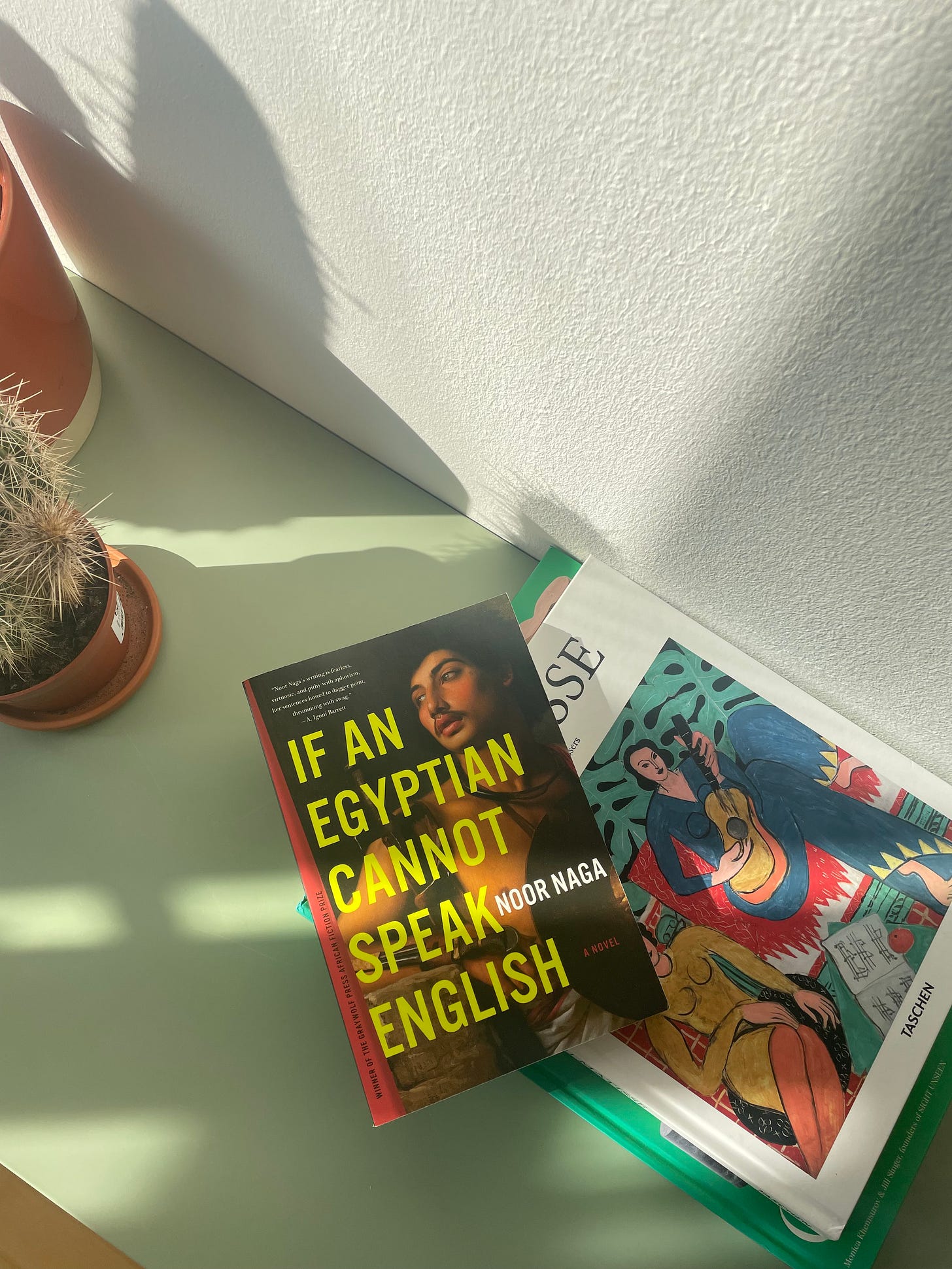
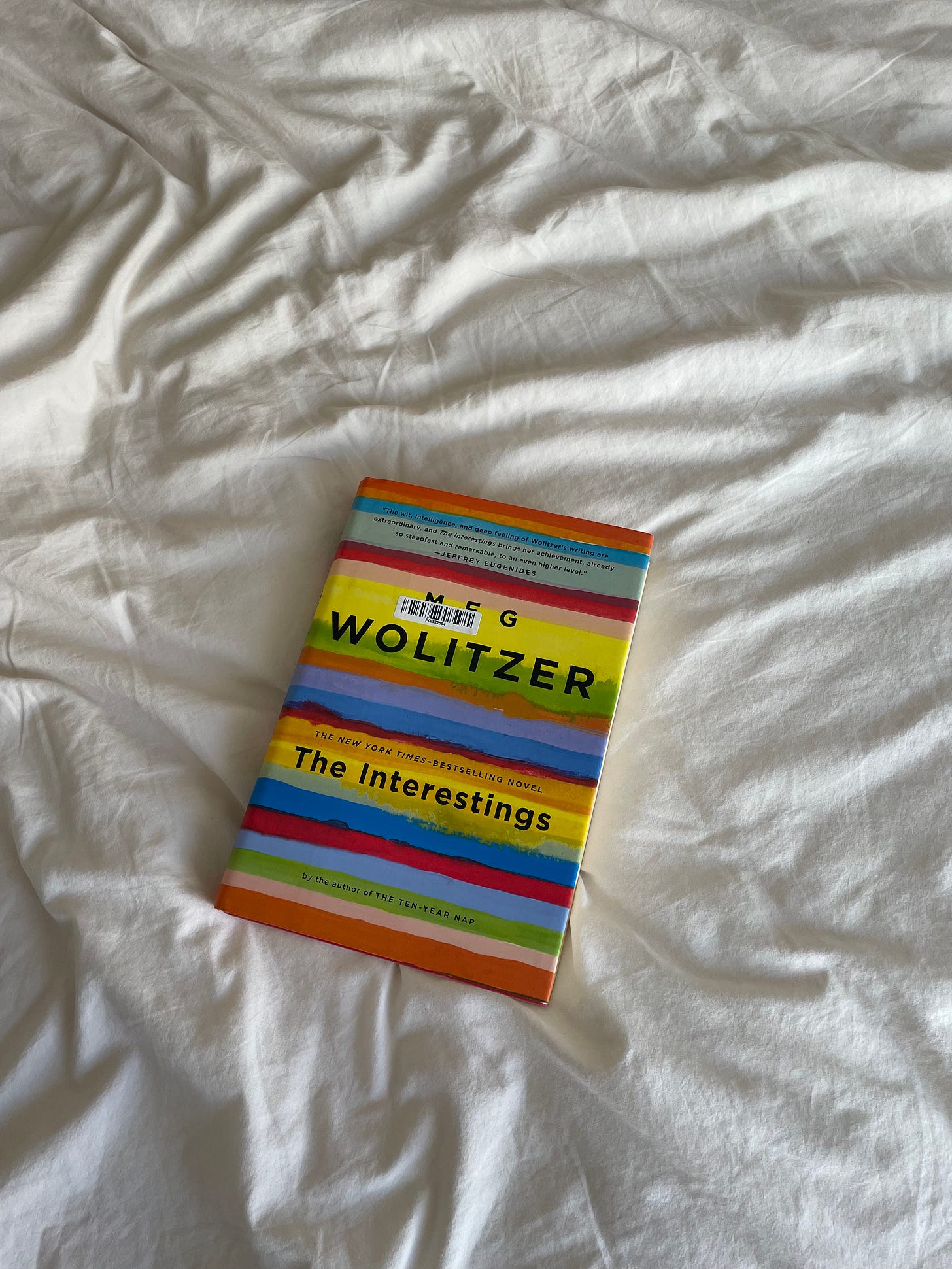
I agree w your Trespasses comments! It was nice enough but I also wanted more drama, and frankly expected more drama. I thought it was, on all counts, average (that’s not a slight - plot was simple, characters were simple, prose was simple etc).
I also neurotically plan what I read in lists on my notes for the upcoming month, so I feel at home reading about how you approach that! I’m barely a mood reader and absolutely a planned reader always! The desire to get the genre and book length balance right each month is soooo real so, I see you girl!
Also really enjoyed the brief but insightful format of your Qs w Tembe - the book sounds great!
i love how you spoke about the rituals of being a person who reads alongside actual reading, like that’s such a beautiful aspect of owning the media you enjoy, being able to make a whole occasion of it all! also, i felt the exact same way about beartown when i was trying to review it and figure out what it is exactly about his writing that i didn’t enjoy, a very circular self important type of narration. love you and your newsletter!